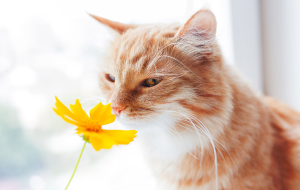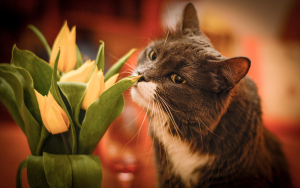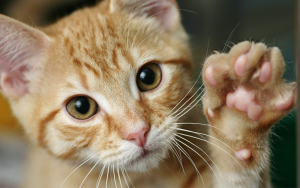Why Do Cats Spray? Understanding Feline Behavior and Solutions to Prevent It

Cats are independent and often mysterious creatures, known for their distinct personalities and behaviors. One behavior that often puzzles cat owners is spraying. While it’s common for cats to mark their territory by spraying urine, this action can raise
concerns for pet owners who are unsure of the causes or how to handle it. This article delves into the reasons why cats spray, the signs of spraying behavior, and practical solutions to prevent it, all while maintaining an SEO-friendly approach for
those seeking to understand feline spraying behavior.
What is Cat Spraying?
Cat spraying, also known as urine marking, refers to a cat’s instinctual behavior of releasing urine onto vertical surfaces. Unlike urination, which is typically done in a litter box or other appropriate area, spraying involves the cat standing with its
tail held high and releasing a small amount of urine on objects, furniture, or walls. This behavior is usually different from the cat’s regular potty habits and can be distressing for both the owner and the cat.
Reasons Why Cats Spray
Spraying is a natural behavior for cats, and it serves various purposes. Understanding the reasons behind this behavior can help cat owners address it more effectively.
1. Territorial Marking
One of the most common reasons cats spray is to mark their territory. Cats are territorial animals, and they use scent to communicate with other cats. When a cat feels that its space is threatened by another cat (either inside or outside the home), it
may spray to establish boundaries. This is particularly common in multi-cat households where competition for space or resources exists.
Spraying serves as a warning to other cats, signaling that the area is already claimed. It’s a form of communication to prevent confrontations and establish dominance in a specific space.
2. Mating Behavior
Unneutered male cats are more likely to spray due to mating instincts. The urine of an unneutered male cat contains strong pheromones, which signal their presence to potential mates. Females in heat or other males will be attracted to the scent, and the
spraying serves as a method of attracting a mate.
In some cases, spayed or neutered cats may also spray due to lingering hormonal influences, though this is less common. The presence of intact (unneutered) cats in the area can also cause neutered cats to spray in response.
3. Stress and Anxiety
Stress and anxiety are significant triggers for cat spraying. Changes in the environment, such as a move to a new home, the introduction of new pets or people, or even loud noises, can make a cat feel unsettled. When cats are stressed, they may resort
to spraying as a way to cope with their emotions.
Additionally, a cat may spray in response to a perceived threat. For instance, if a new pet or animal enters the household, or if a cat feels that its routine is disrupted, it may use spraying to assert its control over the environment and feel more secure.
4. Medical Issues
Although spraying is often behavioral, there are times when it may be a sign of a medical issue. Conditions such as urinary tract infections (UTIs), bladder inflammation, or other urinary tract disorders can cause cats to urinate outside the litter box
or spray inappropriately.
If a cat suddenly begins spraying after previously showing no signs of the behavior, it’s important to rule out medical causes. A visit to the veterinarian can help determine if there are underlying health issues contributing to the spraying.
5. Pheromone Imbalance
Cats communicate with each other using pheromones, which are chemicals released to signal various emotional or physical states. If a cat is exposed to certain pheromones from other animals (e.g., from another cat outside the home or from new pets), it
might feel compelled to spray in response. The pheromone imbalance may cause the cat to feel the need to mark its territory again.
6. Lack of Proper Litter Box Access
Sometimes, a cat may spray as a way of compensating for a lack of access to a clean or appropriately placed litter box. If the litter box is dirty or located in a high-traffic area that the cat doesn’t feel comfortable using, it may resort to spraying
as a substitute for urination.
How to Identify If Your Cat is Spraying
It’s essential to differentiate between spraying and regular urination. While spraying involves a small amount of urine on vertical surfaces, urination typically involves a larger volume of urine and occurs on horizontal surfaces, such as the floor or
the litter box.
Signs that your cat may be spraying include:
- Urine marks on walls, furniture, or objects
- A distinctive, strong odor of cat urine
- The cat standing with its tail erect and quivering as it sprays
- Increased frequency of marking in certain areas
Solutions to Prevent Cat Spraying
Once the cause of the spraying behavior is identified, there are several approaches that cat owners can take to address the issue. Here are some practical steps to reduce or eliminate spraying in cats.
1. Neuter or Spay Your Cat
Neutering or spaying your cat is one of the most effective ways to reduce spraying behavior, especially for male cats. When a cat is neutered, the hormone levels that drive mating behavior are significantly reduced, making it less likely that the cat
will spray in an attempt to attract mates.
If your cat is already neutered or spayed but is still spraying, it could be due to residual hormonal influence, and additional behavioral interventions may be necessary.
2. Provide Plenty of Resources
In multi-cat households, ensure that there are plenty of resources available for each cat. This includes food, water, litter boxes, scratching posts, and resting areas. Cats may spray if they feel that their access to resources is limited or threatened
by other cats. Providing multiple litter boxes, placed in different locations around the house, can help alleviate this stress.
3. Address Stress and Anxiety
Reducing stress and anxiety in your cat can significantly decrease spraying. If the spraying is due to environmental changes, try to create a calm, stable environment for your cat. Gradually introduce new pets or people to your cat’s space and provide
hiding spots or safe spaces where your cat can retreat if it feels overwhelmed.
You can also use pheromone diffusers or sprays (such as Feliway) that help to reduce stress in cats. These products mimic the calming pheromones that cats produce naturally, creating a more secure environment.
4. Clean Up Sprayed Areas Thoroughly
If your cat has already sprayed in certain areas, it’s essential to clean the area thoroughly to remove the scent. Cats have a highly sensitive sense of smell, and any remaining scent can encourage the cat to spray again in the same spot. Use an enzymatic
cleaner designed specifically for pet urine, as these products break down the odor and prevent future marking.
5. Behavioral Training
In some cases, behavioral training can help modify a cat’s spraying habits. Positive reinforcement, such as rewarding the cat for using the litter box or redirecting its behavior, can be helpful. Consult with a veterinarian or animal behaviorist if you’re
unsure how to implement a training plan for your cat.
6. Vet Check-up
If you notice sudden spraying or a change in your cat’s behavior, it’s always a good idea to take your cat to the vet for a check-up. Medical conditions like UTIs, bladder stones, or other urinary tract issues can cause cats to spray, and early intervention
can help address these health concerns.
Conclusion
Spraying is a natural and instinctual behavior for cats, but it can be challenging for owners to manage. Understanding the reasons behind spraying and implementing appropriate solutions is essential in addressing the issue. By neutering or spaying your
cat, reducing stress, providing sufficient resources, and maintaining a clean environment, you can help prevent spraying and create a happier, healthier relationship with your feline companion. If the problem persists, seeking advice from a veterinarian
or animal behaviorist can be beneficial for both you and your cat.







